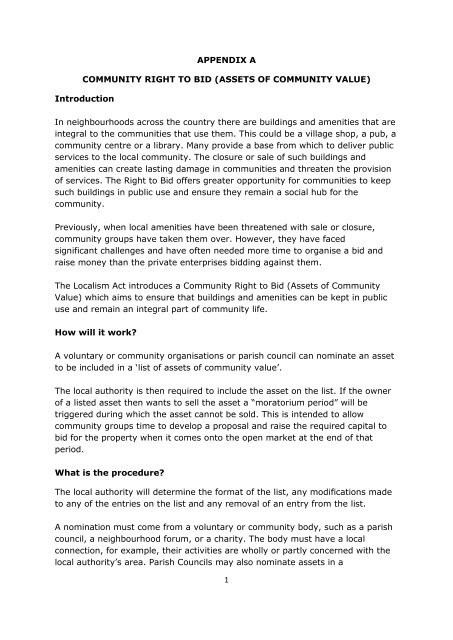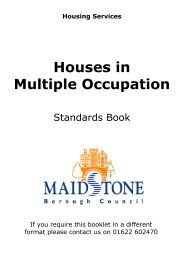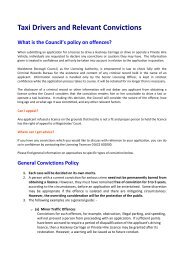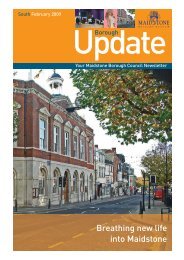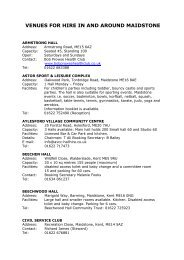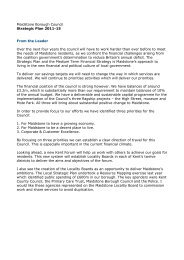What is Right to Bid? - Maidstone Borough Council
What is Right to Bid? - Maidstone Borough Council
What is Right to Bid? - Maidstone Borough Council
You also want an ePaper? Increase the reach of your titles
YUMPU automatically turns print PDFs into web optimized ePapers that Google loves.
APPENDIX A<br />
COMMUNITY RIGHT TO BID (ASSETS OF COMMUNITY VALUE)<br />
Introduction<br />
In neighbourhoods across the country there are buildings and amenities that are<br />
integral <strong>to</strong> the communities that use them. Th<strong>is</strong> could be a village shop, a pub, a<br />
community centre or a library. Many provide a base from which <strong>to</strong> deliver public<br />
services <strong>to</strong> the local community. The closure or sale of such buildings and<br />
amenities can create lasting damage in communities and threaten the prov<strong>is</strong>ion<br />
of services. The <strong>Right</strong> <strong>to</strong> <strong>Bid</strong> offers greater opportunity for communities <strong>to</strong> keep<br />
such buildings in public use and ensure they remain a social hub for the<br />
community.<br />
Previously, when local amenities have been threatened with sale or closure,<br />
community groups have taken them over. However, they have faced<br />
significant challenges and have often needed more time <strong>to</strong> organ<strong>is</strong>e a bid and<br />
ra<strong>is</strong>e money than the private enterpr<strong>is</strong>es bidding against them.<br />
The Local<strong>is</strong>m Act introduces a Community <strong>Right</strong> <strong>to</strong> <strong>Bid</strong> (Assets of Community<br />
Value) which aims <strong>to</strong> ensure that buildings and amenities can be kept in public<br />
use and remain an integral part of community life.<br />
How will it work?<br />
A voluntary or community organ<strong>is</strong>ations or par<strong>is</strong>h council can nominate an asset<br />
<strong>to</strong> be included in a ‘l<strong>is</strong>t of assets of community value’.<br />
The local authority <strong>is</strong> then required <strong>to</strong> include the asset on the l<strong>is</strong>t. If the owner<br />
of a l<strong>is</strong>ted asset then wants <strong>to</strong> sell the asset a “mora<strong>to</strong>rium period” will be<br />
triggered during which the asset cannot be sold. Th<strong>is</strong> <strong>is</strong> intended <strong>to</strong> allow<br />
community groups time <strong>to</strong> develop a proposal and ra<strong>is</strong>e the required capital <strong>to</strong><br />
bid for the property when it comes on<strong>to</strong> the open market at the end of that<br />
period.<br />
<strong>What</strong> <strong>is</strong> the procedure?<br />
The local authority will determine the format of the l<strong>is</strong>t, any modifications made<br />
<strong>to</strong> any of the entries on the l<strong>is</strong>t and any removal of an entry from the l<strong>is</strong>t.<br />
A nomination must come from a voluntary or community body, such as a par<strong>is</strong>h<br />
council, a neighbourhood forum, or a charity. The body must have a local<br />
connection, for example, their activities are wholly or partly concerned with the<br />
local authority’s area. Par<strong>is</strong>h <strong>Council</strong>s may also nominate assets in a<br />
1
neighbouring par<strong>is</strong>h council or unpar<strong>is</strong>hed area. Local authorities cannot l<strong>is</strong>t land<br />
on their own initiative. Nominated assets may be owned by anybody, including<br />
the local authority and the Crown.<br />
The local authority will then have eight weeks <strong>to</strong> determine whether the asset<br />
has been properly nominated and meets the definitions in the regulations, If so,<br />
the asset <strong>is</strong> placed on the l<strong>is</strong>t and all the relevant parties are informed. Th<strong>is</strong><br />
includes placing the asset on the local land charges reg<strong>is</strong>ter and, if the land <strong>is</strong><br />
reg<strong>is</strong>tered, applying for a restriction on the Land Reg<strong>is</strong>ter.<br />
If the owner objects <strong>to</strong> their property being placed on the l<strong>is</strong>t, they have a right<br />
<strong>to</strong> request an internal review by the council. If the owner remains in<br />
d<strong>is</strong>agreement after the review, they have a right of appeal <strong>to</strong> an independent<br />
Tribunal.<br />
If the nomination <strong>is</strong> unsuccessful, the local authority must place it on a l<strong>is</strong>t of<br />
assets nominated but not l<strong>is</strong>ted. If an owner <strong>is</strong> successful in their appeal against<br />
l<strong>is</strong>ting at internal review or Tribunal then the asset must be moved <strong>to</strong> the l<strong>is</strong>t of<br />
unsuccessful nominations.<br />
If land <strong>is</strong> included in the l<strong>is</strong>t of assets of community value it will remain on that<br />
l<strong>is</strong>t for five years, unless d<strong>is</strong>posed of, or there has been a successful appeal<br />
against l<strong>is</strong>ting or when the local authority decides that the asset <strong>is</strong> no longer of<br />
community value.<br />
<strong>What</strong> <strong>is</strong> land of “community value”?<br />
A building or piece of land has community value if:<br />
Actual current use of the land or building that <strong>is</strong> not an ancillary use furthers<br />
the social wellbeing or social interests of the local community, and<br />
It <strong>is</strong> real<strong>is</strong>tic <strong>to</strong> think that there can continue <strong>to</strong> be such use which will<br />
further the social wellbeing or social interests of the local community,<br />
whether or not in the same way<br />
It also includes land or building which has, in the recent past, furthered the<br />
social wellbeing or social interests of the local community, and which it <strong>is</strong><br />
real<strong>is</strong>tic <strong>to</strong> consider will do so again during the next five years.<br />
Exemptions from l<strong>is</strong>ting include residential prem<strong>is</strong>es, and associated gardens and<br />
outbuildings; land licensed for use as a residential caravan site and operational<br />
land of statu<strong>to</strong>ry undertakers.<br />
2
<strong>What</strong> <strong>is</strong> the “mora<strong>to</strong>rium period”?<br />
Once an asset has been l<strong>is</strong>ted nothing further will happen unless and until the<br />
owner decides <strong>to</strong> d<strong>is</strong>pose of it.<br />
Unless an exemption applies, the owner will only be able <strong>to</strong> d<strong>is</strong>pose of the asset<br />
after a mora<strong>to</strong>rium period has expired.<br />
There are two mora<strong>to</strong>rium periods <strong>to</strong> note, both of which start from the date the<br />
owner of the asset notifies the local authority of their intention <strong>to</strong> sell the asset:<br />
‘Interim mora<strong>to</strong>rium period’ – th<strong>is</strong> <strong>is</strong> a six week period during which a<br />
community group w<strong>is</strong>hing <strong>to</strong> bid for the asset must notify the local authority<br />
that they w<strong>is</strong>h <strong>to</strong> be considered as a potential bidder. If th<strong>is</strong> does not happen<br />
the owner can proceed <strong>to</strong> a sale.<br />
‘Full mora<strong>to</strong>rium period’ - th<strong>is</strong> applies if a community group does make a<br />
request during the interim period, and lasts for six months during which the<br />
community group can develop their proposal and ra<strong>is</strong>e the capital required <strong>to</strong><br />
bid for the asset.<br />
After the mora<strong>to</strong>rium period, either six weeks if there has been no community<br />
interest, or the full six months, the owner <strong>is</strong> free <strong>to</strong> sell <strong>to</strong> whoever they choose<br />
and at whatever price. No further mora<strong>to</strong>rium period will apply for the remainder<br />
of a protected period lasting eighteen months.<br />
Are there exemptions from the mora<strong>to</strong>rium period?<br />
There <strong>is</strong> a comprehensive l<strong>is</strong>t of exemptions from the mora<strong>to</strong>rium period. The<br />
main ones are:<br />
D<strong>is</strong>posals which are gifts<br />
D<strong>is</strong>posals in accordance with the will of the deceased owner or under the<br />
intestacy rules, or in order <strong>to</strong> ra<strong>is</strong>e money for matters connected with the<br />
admin<strong>is</strong>tration of the estate<br />
D<strong>is</strong>posals between family members<br />
Sale of land on which a business <strong>is</strong> carried on, <strong>to</strong>gether with the sale of that<br />
business as a going concern.<br />
The full l<strong>is</strong>t of exemptions <strong>is</strong> publ<strong>is</strong>hed in the regulations.<br />
Will compensation be payable?<br />
All owners, other than public authorities, will be entitled <strong>to</strong> claim compensation<br />
for loss or expense incurred as a result of l<strong>is</strong>ting and complying with any of the<br />
procedures required by the scheme.<br />
3
The claim should be made <strong>to</strong> the local authority in writing within 13 weeks of the<br />
end of the interim or full mora<strong>to</strong>rium period or from the date when the land<br />
ceased <strong>to</strong> be l<strong>is</strong>ted. The burden of proof for any claim will rest with the owner.<br />
The local authority must consider the claim and <strong>is</strong> required <strong>to</strong> give written<br />
reasons for its dec<strong>is</strong>ion. No time limit <strong>is</strong> given for responding <strong>to</strong> the claim. The<br />
owner has a right <strong>to</strong> an internal review of a compensation dec<strong>is</strong>ion by the local<br />
authority. If the owner d<strong>is</strong>agrees with the dec<strong>is</strong>ion he may appeal <strong>to</strong> an<br />
independent Tribunal.<br />
How will the scheme be enforced?<br />
Compliance will be encouraged by requiring local authorities <strong>to</strong> inform owners<br />
and other interested parties that an asset has been l<strong>is</strong>ted, <strong>to</strong> enter the l<strong>is</strong>ting on<br />
the local land charges reg<strong>is</strong>ter and, in the case of reg<strong>is</strong>tered land, apply for a<br />
restriction on the Land Reg<strong>is</strong>ter.<br />
Owners will be encouraged <strong>to</strong> comply as non-compliant sales will be void,<br />
meaning that the change of ownership hasn’t taken place.<br />
4


